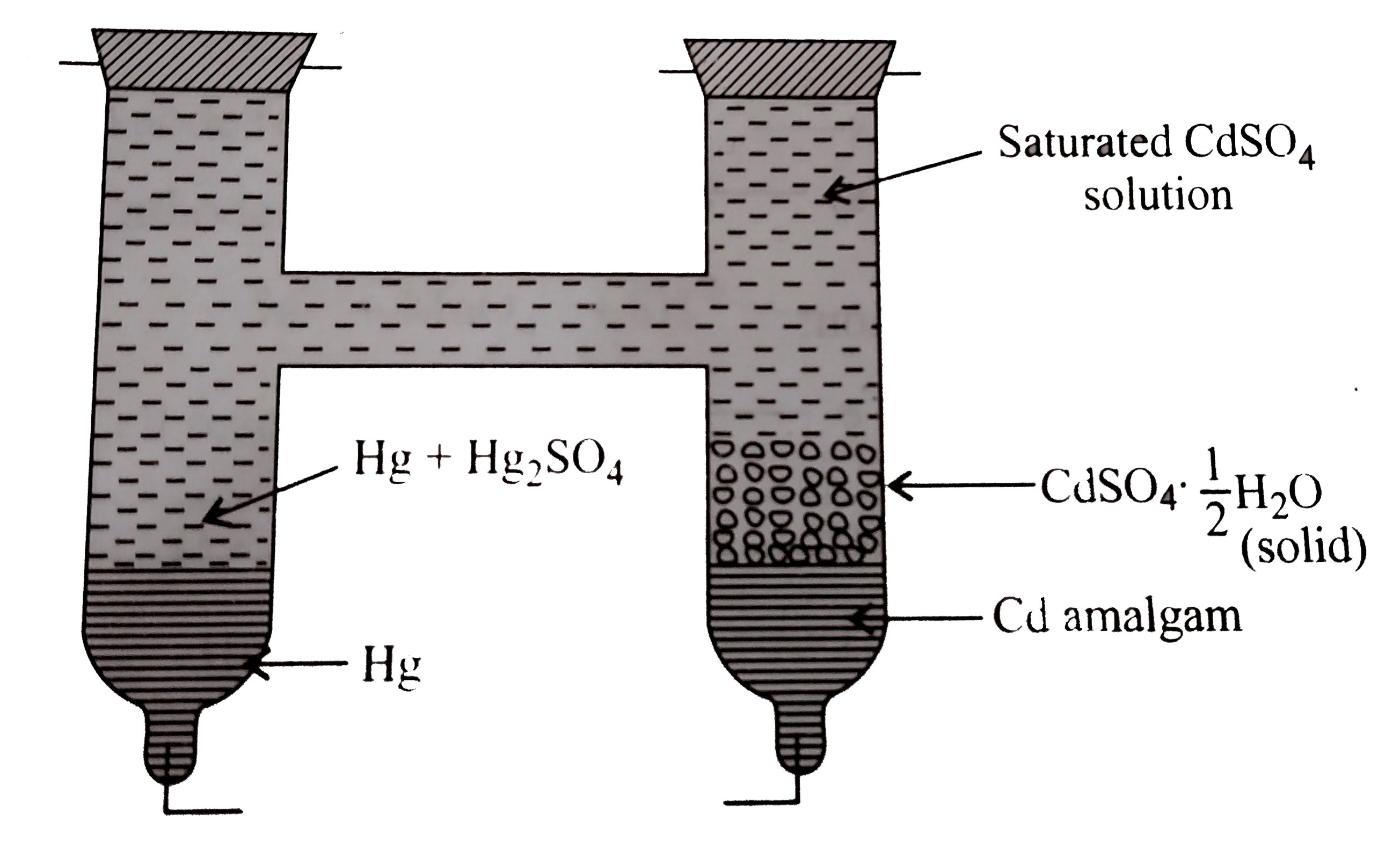Explain the construction and working of Westron standard cell.
Video Solution
Text Solution
Westron cell ( figure) consists of an H− shaped glass vessel with two platinum leads in its two arms at the bottom.
The positive electrode is mercury covered with a paste of mercurous sulphate (Hg2SO4) and Hg. The negative electrode consists of Cd−Hg amalgam containing 12% to 24%Cd by weight . Some crystals of 3CdSO4.8H2O are kept over the electrodes and the remaining portion is filled wiht a saturated solution of CdSO4. The ends are then sealed. This is represented as :
Cd(Hg)∣Cd2+( Saturated )∣|Hg2SO4(s)|Hg
Westron cells are reversible and are not damaged by the passage of current through it. Their EMF does not vary much change in temperature.
The reversible reaction that occurs in the cell during its operation is :
Anode reaction ( from amalgam ):
Cd(s)→Cd2++2e−
[Ec−.(Cd2+∣Cd)=−0.403V]
Cathode reaction :
Hg2SO4(s)+2e−→2Hg(1)+SO2−4
[Ec−.Hg2SO4∣2Hg]=0.6153V
Cell reaction :
¯¯¯¯¯¯¯¯¯¯¯¯¯¯¯¯¯¯¯¯¯¯¯¯¯¯¯¯¯¯¯¯¯¯¯¯¯¯¯¯¯¯¯¯¯¯¯¯¯¯¯¯¯¯¯¯¯¯¯¯¯¯¯¯¯¯¯¯¯¯¯¯¯¯Cd(s)+Hg2SO4→Cd2=2Hg(1)+SO2−4––––––––––––––––––––––––––––––––––––––––––––––––
Ec−.cell=(Ec−.reduction)c−(Ec−.reduction)a
=0.6153V−(−0.403)=1.0183V.

Since the activities of element and solid substance (Cd−Hg2SO4) and mercury are unity and [Cd2+] and [SO2−4] in saturated solution are constant and the standard potential of Cd∣Cd2+ and the standard potential of Hg,Hg2SO4∣SO2−4 are also constant, the Ecell is constant (=1.0183V) at 298K.
|
Topper's Solved these Questions
- ELECTROCHEMISTRYBook:CENGAGE CHEMISTRY ENGLISHChapter:ELECTROCHEMISTRYExercise:Solved Examples (Electrochemical Cell)
Explore 36 Videos
- ELECTROCHEMISTRYBook:CENGAGE CHEMISTRY ENGLISHChapter:ELECTROCHEMISTRYExercise:Solved Examples(Electrolysis And Electrolytic Cells)
Explore 12 Videos
- D AND F BLOCK ELEMENTSBook:CENGAGE CHEMISTRY ENGLISHChapter:D AND F BLOCK ELEMENTSExercise:Archives Subjective
Explore 29 Videos
- GENERAL PRINCIPLES AND PROCESS OF ISOLATION OF ELEMENTSBook:CENGAGE CHEMISTRY ENGLISHChapter:GENERAL PRINCIPLES AND PROCESS OF ISOLATION OF ELEMENTSExercise:Archives (Subjective)
Explore 14 Videos
Similar Questions
Knowledge Check
Describe the principle, construction and working of an AC generator.
Amagaetic effect of currentBheating effect of currentCchemical effect of currentDelectromagnetic induction
Explain how the human ear works.
View SolutionWrite the working of mercury dry cell
View SolutionExplain the working of a refrigerator.
View SolutionExplain the term cell constant.
View SolutionExplain the working of lead storage battery.
View SolutionExplain the mechanism of transcription in a prokaryotic cell.
View SolutionExplain the working of the inner ear.
View Solution
